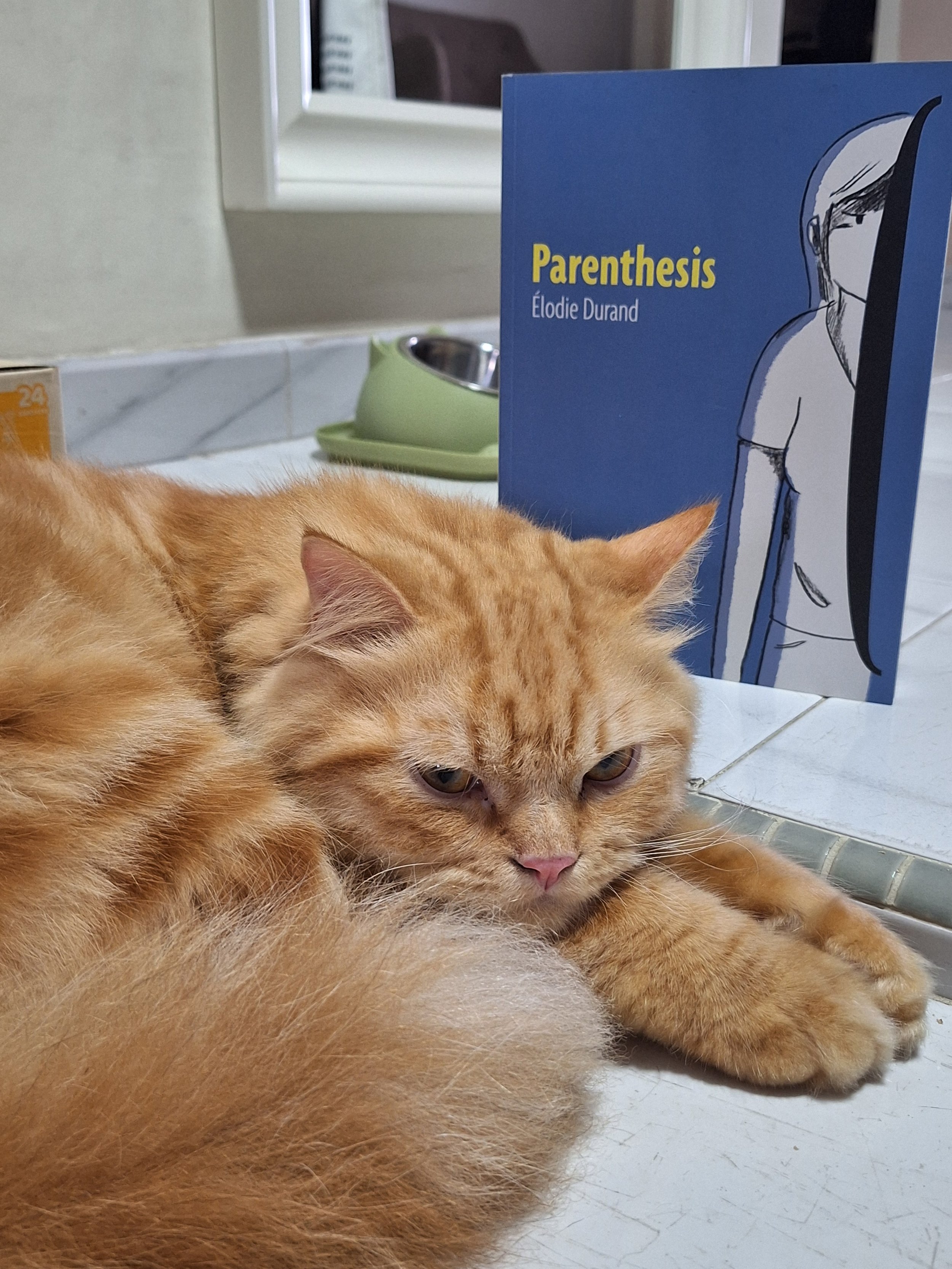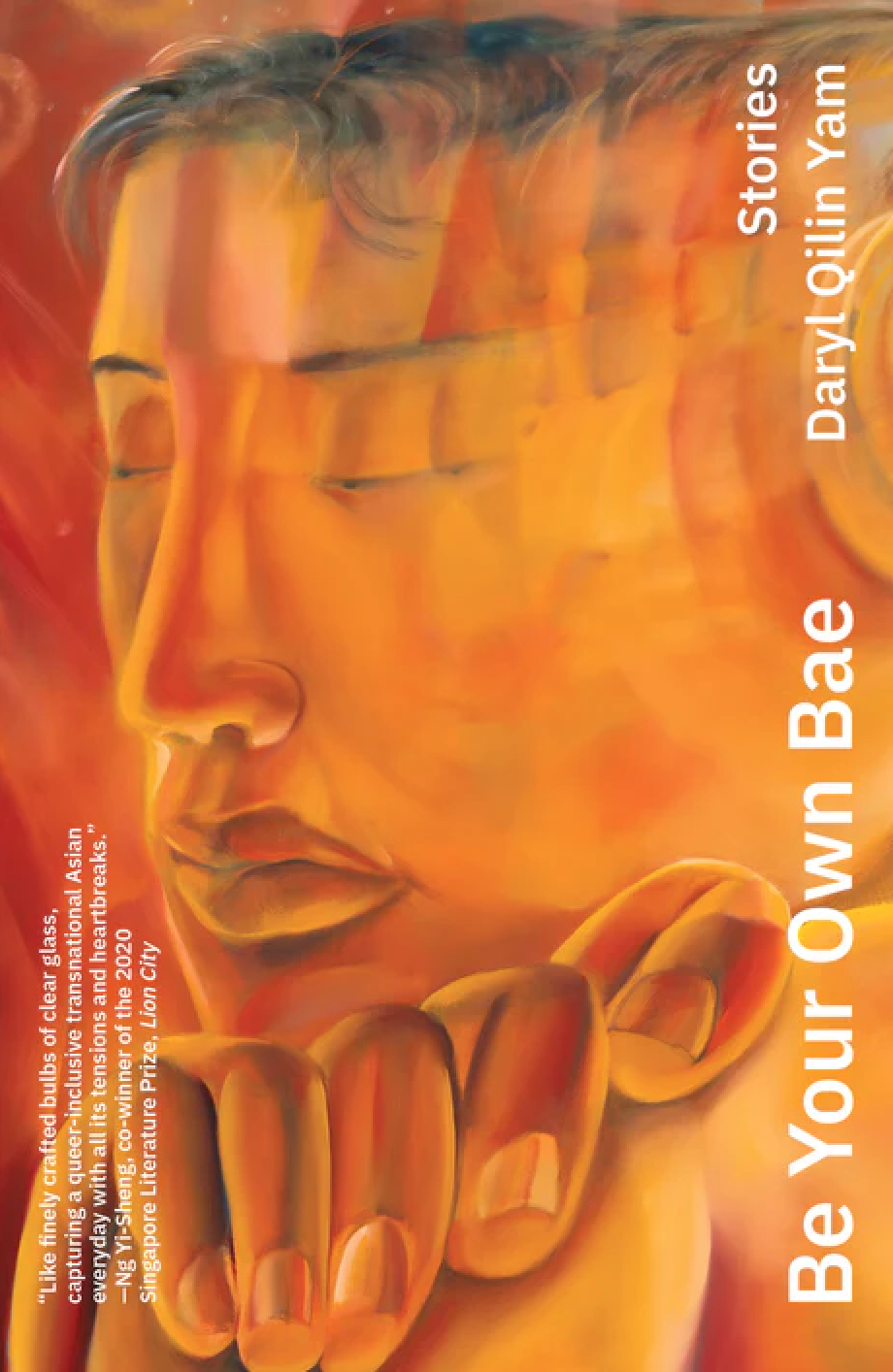#YISHREADS May 2025
By Ng Yi-Sheng / @yishkabob
I don’t talk about poetry on this site enough. Not because I’ve stopped reading it—slim chapbooks are terribly convenient for a Bookstagrammer’s schedule—but because it’s often hard to casually toss out a decent review of a poetry collection. I can’t summarise a plot like I would for a novel, and it can be bloody hard to pin down a shared theme or motif worth talking about. Even naming my favourite pieces can be a conundrum once I realise how they work differently in isolation!
Ultimately, it’s the words themselves that matter; words and the spaces between them. Which is why I keep violating copyright law by sharing pics of the verses themselves on the app’s twenty-image carousel.
But enough with the self-castigations. Enclosed, please find my thoughts on five collections, all published by Asian poets and translators within the past three years, many of them playing with polyglossia, ethnic identity and queerness—especially the final entry, which is me weighing in on the current wave of pushback against Ocean Vuong.
dragon.paper.wind. (龙卷风), by Crispin Rodrigues
Ethos Books, 2024
OK, wow. I'd heard that this surpassed the poet’s three previous publications (Pantomime, How Now Blown Crow, The Nomad Principle), but I still wasn't quite prepared for how strong this collection would be—it’s balancing lyricism, experimentation, performance poetry, personal and ethnic trauma, family and cultural history, etc., yielding a work that’s wild, rich and intensely readable.
Principally, Rodrigues is leaning into his identity as a 21st century Singaporean Eurasian, which involves an acknowledgment of impurity—but rather than hide his 3/4 Chinese heritage and his immersion in Singaporean Chinese hegemony, he’s leaning into his belonging/unbelonging, putting it right in the title, filling poems with way more Mandarin than Kristang, written in ideograms, not pinyin; no asterisks; the explanations coming as a surprise in the endnotes.
Sure, there’s a poem about his grandma’s sugee cake—“Kitchenwork”—but he’s problematising rather than glorifying nostalgia, drawing on Portuguese figures like Afonso de Albuquerque and Fernando Pessoa for their foreignness rather than any genealogical familiarity, detailing the strangeness of meeting family members who’ve emigrated to the UK and lost their Asianness, complicating his identity endlessly in a series of six poems all titled “origin story” and seven beginning with “self-portrait”. Plus, he’s weaving in stories of dysmorphia, e.g. “the ideal face”, “my race wants me to have a body like joseph schooling”, braiding his discomfort with his body with society’s discomfort with his own minority/mixed status.
Not to cast shade on Denyse Tessensohn or Melissa de Silva, but I really do think this could be considered the go-to text for expressing what it’s like to be Eurasian in Singapore today, with all its complications, erasures of heritage, and even skepticism—his references to anxieties about Eurasian “extinction” poke fun at the innate absurdity of the concept by invoking of the Stegosaurus. Yet it’s also super-relatable for a lot of the rest of us who chafe against compulsory Chineseness, who feel culturally dislocated, who aren’t 100% happy with our bodies. Extremely worth checking out.
The Lantern and the Night Moths: Five Modern and Contemporary Chinese Poets
Selected and translated by Yilin Wang
Invisible Publishing, 2024
This is the same translator who raised hell against the British Museum in 2023 for using her translations of Qiu Jin / 秋瑾's poetry without permission or payment! [1] I had the fortune of attending her London launch last year at Shaftesbury Avenue’s iconic Guanghwa Bookshop.
As Wang explains in the text, they’re super-aware of issues of underrepresentation in Anglophone publishing: non-English authors, non-Westerners, marginalised genders—on the side of translators as well as authors. So instead of doing a Chinese poetry 101 book, she’s specifically chosen to highlight more obscure writers: Qiu Jin, of course (she's more famous as an early 20th century revolutionary feminist than a poet), but also Republican Chinese intellectuals like Fei Ming / 废名 and Dai Wangshu / 戴望舒, whose poetries are shockingly mystical and abstruse; plus contemporary poets Zhang Qiaohui / 张巧慧 and Xiao Xi / 小西, both born in the seventies, the former talking about her connections with Sichuanese dialect culture; the latter with the insanity of the modern capitalist world.
Wang also works against expectations by giving rather little biographical info—her notes come after each set of translations, so that we’re plunged into poetic voice without introduction, while the notes themselves dwell primarily on the process and meaningfulness of translation. (For the curious, more complete bios are supplied at the book's end.)
In Qiu Jin she sees a fellow genderqueer writer, subverting expectations of women’s poetry when she writes not of longing for a man but for a kindred spirit / 知音 who’ll understand her—perhaps the translator themself?—and of the struggles with ambiguity and connotation. But they’re also drawing inspiration from reading the Republican poets who, like them, were translators and theorists of translation—she's moved by Dai’s knowledge of which bookshops specialised in what in Paris, Hong Kong and Madrid (he translated from French, Spanish, Italian and Russian), reminding her of their own difficulty searching for Chinese books in Vancouver provision stores.
It Takes So Much to Be Nothing: Pomes 2018-2024, by Jack Malik
Maya Press, 2024
This Malaysian poet’s published three collections so far, but all in Malay. This is his first English work: full-chested spoken word pieces and shape poems about his love for his hometown of Ipoh and his new environs of Petaling Jaya; snapshots of slacker spirit; musings on monsoons and music and movement and the art of poetry itself.
I genuinely dig the way he uses language, blending not only English and Malay but also a bunch of Arabic, drawing on Sufi poets by way of Allen Ginsberg and Salleh Ben Joned—even embracing personal orthography, e.g. his consistent spelling of “poem” as "pome". Mind you, not every poem lands, and on a second read, it's a little bizarre how unpolitical the pieces are—the spoken word scene of the 2010s I remember was full of strident criticism of the government—feels like he’s full of the ebullience of youth and he’s not directing it anywhere obvious except into experimental form, beauty and energy.
Still, that's perhaps a facile reading of work that’s joyously Muslim without being conservative, that loves the everydayness of Malaysia without party or movement or affiliation, that’s both local and global at the same time. Would recommend, obviously.
Unanimal, Counterfeit, Scurrilous, by Mark Anthony Cayanan
University of Santo Tomas Publishing House, 2024
First published by Giramondo in 2021, this here’s a collection dominated by prose poems, reflecting on the condition of entering middle age as a gay Pinoy man, intermingling visceral details of everyday Manila with its hangouts and hookups with motifs from Thomas Mann’s novella Death in Venice. This means a simultaneous empathy with the perspectives of the aging Aschenbach and the beautiful boy Tadzio, which is oddly familiar—there’s this whole thing with a lot of us Asian men where we still look kinda young and waifish, even when we're old and jaded.
There’s no by-the-numbers narrative here; no correspondence to chapters; instead a dreamlike wandering between states, accompanied by wry and weary commentary, with recurring references to garlic and vinegar, mosquitoes, vaporettos, tyranny, physical beauty, Latin. Gorgeously textured language with occasional baroque vocabulary (“verdigris”, “stilettos”, “masegno”, “katabatic”) and jarring contemporaneities (“IG-worthy”), but with restraint: he’s not trying to bamboozle us with sensations; he’s instead guiding us through the dissolute dissatisfaction of being in a body and city that are old but not so old that they’ve found peace or dignity, still busy with desire and the memory of being desired.
Hard to pin down—poems run into each other so fluidly that I’m unsure how to name a favourite—and indeed, titles recur, e.g. “As Aschenbach”, “Naïve and sentimental”; many of them quotes from Mann. Shades of Cyril Wong—they’re both Southeast Asian queer poets who’re not terribly interested in representing cultural identity; instead testifying to a possibly universal queer sadness and ennui.
Time Is a Mother, by Ocean Vuong
Penguin, 2022
I wasn’t gonna talk about this book—Vuong doesn’t really need the publicity, does he?—but then Andrea Long Chu’s Vulture article came out, [2] and I feel I’ve gotta respond to that hit job.
Regarding the collection: it’s the poet’s second, following Night Sky with Exit Wounds. Despite its title, it doesn’t dwell that much on his mother’s legacy, which he explored pretty thoroughly (with the caveat of fictionalisation) in his novel On Earth We’re Briefly Gorgeous. Only a handful of works seem to refer specifically to her, e.g. “Amazon History of a Former Nail Salon Worker” and “Dear Rose”.
Instead, the bulk of the work dwells on the deep sadness of being where he is now, to the extent that he recalls his boyfriend’s grandmother’s escape from Auschwitz in “Nothing”. And yeah, I’d have thought success, with a best-selling poetry book and a stable job and a handsome white boyfriend, might bring him happiness or at least healing. But nope: in “Not Even”, he says “I used to be a fag now I'm a checkbox... Once at a party set on a rooftop in Brooklyn for an ‘artsy vibe’, a young woman said, sipping her drink, You're so lucky. You're gay plus you get to write about war and stuff. I'm just white. [Pause] I got nothing. [Laughter, glasses clinking].”
Chu calls this out in her essay “The Romance of Being Unreadable”, highlighting “the peril faced by every marginalized writer: He may become so accustomed to the margins he cannot recognize the center even when he is standing in it.” More pointedly, she takes issue with his shallow understanding of the Vietnamese language, making way too much out of the near-homonymity of “yêu” (love) and “yếu” (weakness) in the book’s title poem; how as a diasporic writer he’s managed “to style himself as an ambassador of the very culture that, thanks to the realities of diaspora, has largely escaped him.” [3]
Hers is a valuable critique, and not an ungenerous one, given her praise of much of Vuong’s other work, including the closing poem of the collection. Nevertheless, I’d like to defend the more cringe-worthy aspects of Time Is a Mother, because they remain genuine reflections of a young Asian American’s specific perspectives (naïveté isn’t insight, but it’s charming in its own right, especially to non-American Asians like myself) and the ambiguous state of success (if you’ve watched enough biopics, you’ll know triumph and depression are vigorous bedmates).
Plus, the book’s full of moving, resonant explorations of Americana—I’m particularly fond of the metaphors of “Old Glory”—and he manages to ride that line of being both deeply literary and accessible, never dipping into the banality of Lang Leav or Rupi Kaur. In an age of declining literacy, his popularity among younger readers is a thing to be celebrated rather than scorned—a sign that, despite everything, poetry will survive.
Endnotes
[1] The translator’s laid out a blow-by-blow account of this saga at “Yilin’s translations of Qiu Jin’s poetry & fight against the British Museum”. Yiin Wang. https://yilinwang.com/qiu-jin-translations-yilin-wang-british-museum/
[2] Andrea Long Chu. “The Romance of Being Unreadable.” Vulture. 6 May 2025. https://www.vulture.com/article/ocean-vuong-the-emperor-of-gladness-book-review.html
[3] Chu’s pithy quote is, she says, a paraphrase of a point in the opening paragraph of Som-Mai Nguyen. “Blunt-Force Ethnic Credibility.” Astra. 30 June 2022. https://astra-mag.com/articles/blunt-force-ethnic-credibility/
Ng Yi-Sheng (he/him) is a Singaporean writer, researcher and LGBT+ activist. His books include the short-story collection Lion City and the poetry collection last boy (both winners of the Singapore Literature Prize), the non-fiction work SQ21: Singapore Queers in the 21st Century, the spoken word collection Loud Poems for a Very Obliging Audience, and the performance lecture compilation Black Waters, Pink Sands. He recently edited A Mosque in the Jungle: Classic Ghost Stories by Othman Wok and EXHALE: an Anthology of Queer Singapore Voices. Check out his website at ngyisheng.com.








In Taiwan Travelogue, ‘twinned souls… are at once lost, but also found, in translation.’ A review by Eunice Lim.